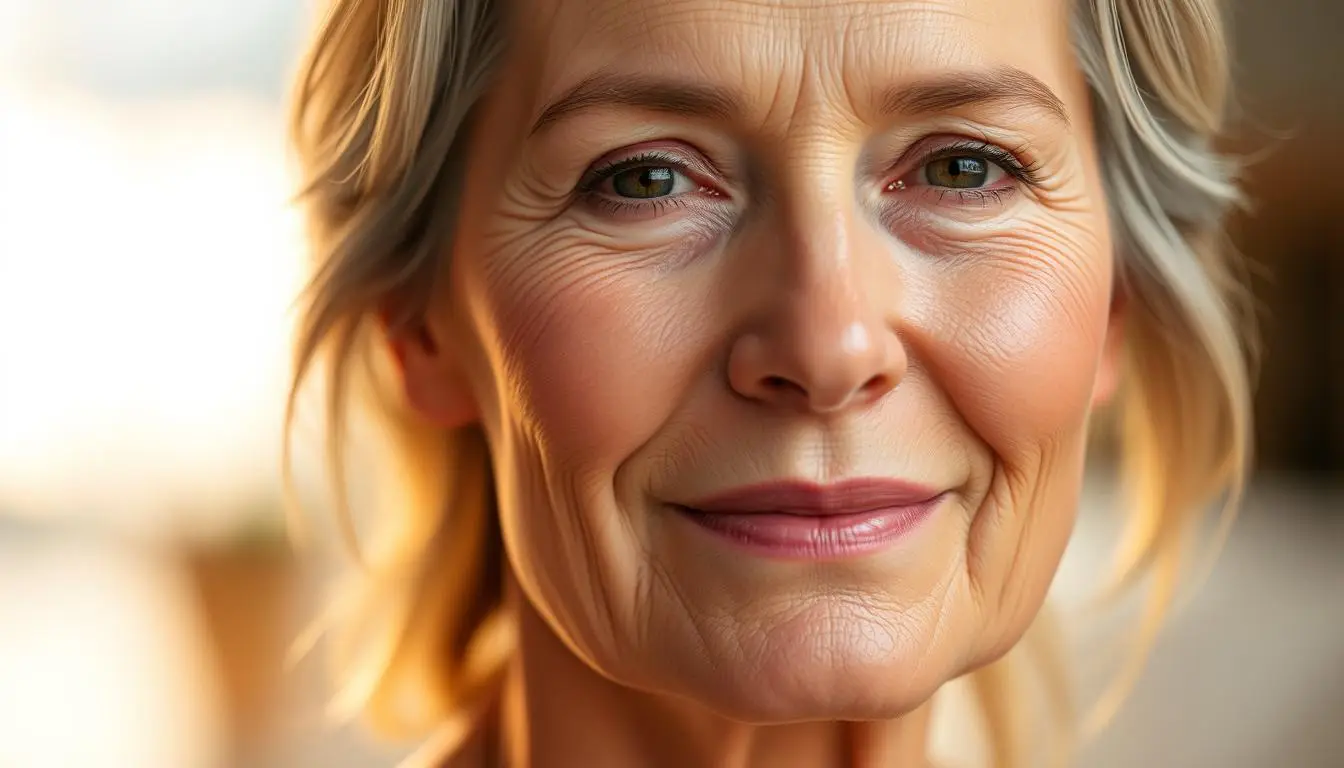Navigating through mid-life are not always easy as being a female. Most of you will always want to stay young, healthy, and energetic. All these are normally easy to achieve when you are young, but it tends to get harder as you are getting older. Things you never considered an issue will all of suddenly became an issue. Mid-age women tend to have harding time to maintain overall well-being.
For example, when you are in your 20s, you tend to be able to stay up late partying and don’t sleep until 4am. The next day you will feel fine. As you age, all these will become a matter. Especially when you reach the middle-age. The middle-age group varies but it typically refer to age from 30-59.
This period often involves balancing various roles while adapting to physical, emotional, and lifestyle changes. This stage often characterized by a complex interplay of hormonal changes, lifestyle adjustments, and evolving personal and professional role. It can bring some challenges and also opportunities. Recognizing and understanding these changes is crucial. So how do you navigate through this period of life and able to thrive through these transformative years?
Physically, mid-age women may experience menopause, a natural biological process marking the end of menstrual cycles. Symptoms can include hot flashes, night sweats, and sleep disturbances. Additionally, metabolic rates may slow, leading to weight gain and changes in body composition. Bone density can also decrease, increasing the risk of osteoporosis. Regular health screenings and a balanced diet are essential to manage these physiological shifts effectively.
Emotionally, mid-age can be a period of reflection and reassessment. Many women face the ’empty nest syndrome’ as children leave home, which can lead to feelings of loss and identity shifts. It’s also a time when career might plateau or pivot, adding another layer of emotional complexity. Engaging in hobbies, seeking professional guidance, and fostering strong social networks can be beneficial in navigating these emotional landscapes.
Socially, mid-age women often find themselves in caregiving roles, whether for aging parents or grandchildren. The demands of caregiving can be immense to balance between personal needs and responsibilities. It’s vital to recognize the importance of self-care and to seek support when needed to maintain a healthy social life.
Focusing on improving your overall well-being is essential to these period of your life. By acknowledge and addressing these specific challenges can enhance the quality of life and well-being. Here are 10 areas a mid-age women should concentrate on to maintain overall health and happiness.
Disclosure: This post may contain affiliate links and I may receive a small commission if you purchase through them. There is no additional charge to you.
1. Prioritizing Physical Health
As women reach mid-age, prioritizing physical health becomes crucial for enhancing and maintaining overall well-being. Regular exercise, balanced nutrition, and routine medical check-ups all play essential roles in this process. Physical activity is a cornerstone of good health, and incorporating a variety of exercises can provide numerous benefits. Strength training helps build and maintain muscle mass, which naturally declines with age. Flexibility exercises, such as yoga or stretching routines, can improve mobility and reduce the risk of injury. Additionally, cardiovascular workouts like brisk walking, swimming, or cycling are vital for heart health and can aid in maintaining a healthy weight.
Aim for at least 150 minutes of moderate aerobic activity or 75 minutes of vigorous activity each week, combined with muscle-strengthening activities on two or more days a week. Activities like brisk walking, yoga, swimming, or weight lifting not only improve physical health but also boost mood and energy levels.
Nutrition is equally important. A balanced diet rich in essential vitamins and minerals supports bodily functions and overall vitality. Mid-age women should focus on consuming adequate amounts of calcium and vitamin D to support bone health, as the risk of osteoporosis increases with age. Food such as dairy products, leafy greens, and fortified cereals are good to increase the calcium and vitamin D. Drinking plenty of water and limiting alcohol consumption are also key for optimal health. Iron, folic acid, and vitamin B12 are also important to prevent anemia and support overall energy levels. Including a variety of fruits, vegetables, lean proteins, and whole grains can provide the necessary nutrients and help maintain a healthy weight.
Routine medical check-ups are imperative for early detection and prevention of potential health issues. Regular screenings for conditions such as breast cancer, osteoporosis, and heart disease are essential. Mammograms, bone density tests, and cholesterol level checks should be part of a comprehensive health maintenance plan. These screenings, alongside a proactive approach to health, can significantly contribute to early intervention and better management of any conditions that may arise.
Incorporating these elements into daily life can significantly enhance physical well-being and pave the way for a healthier, more vibrant future. By prioritizing physical health through regular exercise, balanced nutrition, and routine medical check-ups, mid-age women can maintain their overall well-being and enjoy a higher quality of life.
2. Mental Well-Being and Stress Management
Mental well-being is a crucial aspect of overall health, particularly for mid-age women who often juggle multiple responsibilities. Effective stress management is essential in maintaining mental clarity and reducing the risk of anxiety and depression. One of the most effective approaches to managing stress is through mindfulness practices. Mindfulness involves being fully present and engaged in the moment, which can significantly reduce stress levels and improve mental clarity.
Meditation is another powerful tool for enhancing mental well-being. Regular meditation can help in calming the mind, improving focus, and fostering a sense of inner peace. Even a few minutes of meditation each day can lead to noticeable improvements in mental health. Yoga is alway a great option to improve your well-being. Yoga combines phyical postures with breath control and meditation, offers a holistic approach to stress management. It not only enhances physical flexibility and strength but also promotes mental relaxation and emotional stability. Deep breathing exercises are also a great way to relax your mind. There are mediation program that can help you to find that inner peace.
In addition to these practices, it is essential to recognize when professional help is needed. Seeking support from a mental health professional can provide valuable insights and strategies for managing stress and maintaining mental well-being. Therapy or counseling can offer a safe space to explore thoughts and feelings, leading to better coping mechanisms and improved mental health.
Engaging in hobbies and maintaining social connections also play a significant role in mental well-being. Hobbies provide a creative outlet and a break from daily stressors, while social interactions offer emotional support and a sense of community. Whether it’s joining a book club, taking up painting, or simply spending time with friends and family, these activities can greatly enhance mental health.
Integrating these practices into daily life may seem challenging, but it can be achieved with small, consistent efforts. Setting aside a few minutes each day for mindfulness or meditation, attending a weekly yoga class, and making time for hobbies and social activities can collectively contribute to better mental well-being and effective stress management for mid-age women.
3. Maintaining Strong Social Connections

Social connections play an integral role in enhancing and maintaining overall well-being, particularly for mid-age women. During this period, you may face the ’empty nest syndrome’. It’s important to spend time with your family, friends, and involve with community. These engagements can contribute significantly to emotional health, providing a sense of belonging and purpose.
One of the key benefits of maintaining a social life is the positive impact on mental health. Engaging in meaningful conversations, sharing experiences, and participating in communal activities can lead to improved mood, lower levels of stress, and a greater sense of happiness. Additionally, social interactions can stimulate cognitive functions, helping to keep the mind sharp and engaged.
To stay socially active, consider joining clubs or organizations that align with personal interests or hobbies. Whether it’s a book club, a gardening group, or a fitness class, these settings provide opportunities to meet like-minded individuals and build new friendships. Volunteering is another excellent way to connect with others while contributing to the community. It not only offers a sense of fulfillment but also opens doors to new social networks.
Attending local events, such as cultural festivals, community fairs, or educational workshops, can also be an effective way to expand social circles. These events create a platform for interaction and engagement, fostering a sense of community and shared experience.
Despite the numerous benefits, maintaining social ties can be challenging amidst the demands of a busy life. To overcome these obstacles, it is essential to prioritize social activities and make them a regular part of the routine. Setting aside dedicated time for family gatherings, regular catch-ups with friends, or participating in community activities can help ensure that social connections remain strong.
Utilizing technology can also aid in maintaining relationships, especially when physical meet-ups are not feasible. Video calls, social media platforms, and online communities offer convenient ways to stay connected and engaged with loved ones, no matter the distance.
In conclusion, fostering and maintaining strong social connections is crucial for the overall well-being of mid-age women. By actively participating in social activities and prioritizing relationships, individuals can enhance their emotional health, build a supportive network, and lead a more fulfilling life.
4. Financial Health and Planning for the Future

Financial health is a critical component of overall well-being, especially for mid-age women who are often balancing multiple financial responsibilities. Establishing a strong financial foundation begins with effective budgeting. A well-structured budget helps in tracking income and expenses, ensuring that essential needs are met while also allowing for savings and discretionary spending. To create a budget, start by listing all sources of income and categorizing expenses into fixed, variable, and discretionary costs. Regularly review and adjust the budget to reflect changes in financial circumstances.
Saving for retirement is another crucial aspect of financial health. It’s important to start saving early and consistently, taking advantage of employer-sponsored retirement plans such as 401(k)s or individual retirement accounts (IRAs). Aim to contribute at least enough to receive any employer match, as this is essentially free money towards retirement. Diversifying investments within retirement accounts can also help in managing risk and maximizing returns over time. Consider consulting a financial advisor to tailor a retirement savings strategy that aligns with your long-term goals and risk tolerance.
In addition to saving for retirement, savvy investing is key to growing wealth and securing financial stability. Basic investment principles include understanding risk tolerance, diversifying assets, and staying informed about market trends. For those new to investing, starting with low-cost index funds or exchange-traded funds (ETFs) can provide broad market exposure with lower risk. It’s also beneficial to periodically review and rebalance your investment portfolio to ensure it remains aligned with your financial goals.
Assessing your current financial status is the first step in setting realistic financial goals. Begin by calculating your net worth, which is the difference between your assets and liabilities. This provides a clear picture of your financial position and helps in identifying areas for improvement. Setting specific, measurable, achievable, relevant, and time-bound (SMART) financial goals can guide your efforts and track progress.
Finally, seeking professional financial advice can offer personalized guidance and strategies for managing finances effectively. Financial advisors can provide insights on tax planning, estate planning, and wealth management, helping to navigate complex financial decisions. Staying informed about financial matters through reliable sources such as financial news, books, and online courses is also essential for making informed decisions.
5. Hormonal Health and Managing Menopause
As women reach mid-age, hormonal health becomes a critical area of focus, particularly with the onset of menopause. This biological transition marks the end of a woman’s reproductive years and comes with a variety of symptoms that can impact overall well-being. Common symptoms of menopause include hot flashes, night sweats, mood swings, and irregular periods. Additionally, some women may experience insomnia, weight gain, and a decrease in bone density, which can elevate the risk of osteoporosis.
Effective management of menopause requires a multifaceted approach. Lifestyle changes can significantly alleviate symptoms and improve quality of life. Regular physical activity, such as walking, swimming, and yoga, can help manage weight, improve mood, and strengthen bones. Dietary adjustments are equally important; a balanced diet rich in calcium, vitamin D, and phytoestrogens can support bone health and mitigate some menopausal symptoms. Foods such as leafy greens, soy products, and nuts are beneficial additions to the diet.
In some cases, medical treatments may be necessary to manage more severe symptoms. Hormone Replacement Therapy (HRT) is a common option that can help stabilize hormone levels and provide relief from hot flashes and night sweats. However, HRT is not suitable for everyone, and it’s essential to consult healthcare providers to discuss potential risks and benefits. Non-hormonal medications, such as antidepressants or blood pressure drugs, may also be prescribed to manage specific symptoms. There are also supplement that are more natural to help with menopause that may worth a try.
Beyond these strategies, it is crucial for mid-age women to maintain open communication with their healthcare providers. Personalized advice and support can ensure that each woman receives the most appropriate and effective care for her unique situation. Regular check-ups and screenings can also help monitor and manage menopausal symptoms more effectively. By taking a proactive approach to hormonal health, mid-age women can navigate menopause with greater ease and continue to lead fulfilling lives.
6. Embracing Self-Care and Personal Time
Mid-age women often encounter numerous responsibilities that can make self-care seems to be an optional need than a necessity. Embracing self-care and personal time is so crucial for both mental and physical health. It allows women to recharge, reduce stress, and improve overall life happiness.
Self-care activities can vary widely, catering to different preferences and needs. Spa days, for instance, offer a serene escape where the mind and body can rejuvenate. Engaging in hobbies such as painting, gardening, or reading can provide a sense of accomplishment and joy. Quiet time for reflection, whether through meditation, journaling, or simply taking a walk in nature, can help in gaining clarity and inner peace.
Incorporating self-care practices into a busy schedule may seem daunting, but it is achievable with mindful planning. Start by setting aside small pockets of time each day for activities that bring joy and relaxation. This could be as simple as a 10-minute meditation session in the morning or a leisurely evening walk. Weekends can be reserved for more extended self-care routines, such as spa treatments or engaging in hobbies that require more time.
It is also important to address the potential guilt associated with taking time for oneself. Many women feel that prioritizing their own needs might come at the expense of neglecting other responsibilities. However, self-care is not a selfish act; it is essential for overall well-being. By taking care of oneself, women can better manage stress, maintain a positive outlook, and be more present and effective in their roles, whether at work or home.
In essence, self-care should be viewed as a critical component of a healthy lifestyle. By regularly engaging in activities that nourish the mind, body, and soul, mid-age women can enhance their overall well-being and lead a more balanced, fulfilling life.
7. Staying Mentally Active and Lifelong Learning to Foster Cognitive Health
Maintaining mental acuity is crucial for overall well-being, especially as women reach their mid-age years. Engaging the mind through lifelong learning and intellectual stimulation can significantly enhance cognitive health. A variety of activities can serve this purpose, such as reading, solving puzzles, acquiring new skills, or adopting new hobbies. These pursuits not only keep the brain engaged but also provide a sense of accomplishment and joy.
Reading, for instance, is an excellent way to stimulate the mind. Whether it’s fiction, non-fiction, or academic literature, reading broadens perspectives and enhances vocabulary. Puzzles and brain games, such as crosswords and Sudoku, can also serve as effective mental exercises that improve problem-solving skills and memory retention.
Learning new skills is another valuable avenue for mental stimulation. This could range from mastering a musical instrument to picking up a new language. Not only does this keep the brain active, but it also introduces a sense of novelty and challenge, which can be incredibly rewarding. Similarly, taking up new hobbies like painting, knitting, or gardening can provide both mental engagement and physical activity.
Continued education, whether through formal classes or self-directed learning, offers substantial benefits. Many community colleges and online platforms provide courses that cater to various interests and skill levels. These classes not only impart knowledge but also foster social connections and a sense of community. For those who prefer self-directed learning, resources like online tutorials, webinars, and educational podcasts are readily accessible.
Finding and engaging in these activities is simpler than it may seem. Local libraries, community centers, and online forums are excellent places to start. Additionally, setting aside dedicated time each week for these pursuits can help integrate them into daily routines. The positive impacts on cognitive health are well-documented, including improved memory, enhanced problem-solving abilities, and a reduced risk of cognitive decline.
Incorporating lifelong learning and mental stimulation into daily life is a proactive step towards maintaining mental agility and overall well-being. It embodies the principle that it’s never too late to learn and grow, ensuring that the mind remains as active and vibrant as the body.
8. Cultivating a Positive Outlook and Gratitude
Cultivating a positive outlook and practicing gratitude are essential components of overall well-being, particularly for mid-age women. Positivity has been shown to have a profound impact on both mental and physical health. A positive mindset can reduce stress, enhance immune function, and improve cardiovascular health. Additionally, gratitude can foster a sense of contentment and happiness, which are crucial for maintaining a healthy and balanced life.
One effective way to cultivate positivity is by keeping a gratitude journal. Regularly writing down things you are thankful for can shift your focus from what is lacking in your life to what you already have. This simple practice can help rewire your brain to recognize and appreciate the positive aspects of your daily experiences. Moreover, positive affirmations can play a significant role in maintaining an optimistic outlook. Repeating affirmations such as “I am strong,” “I am capable,” or “I am worthy” can reinforce positive self-beliefs and counteract negative thoughts.
Surrounding oneself with positive influences is another key strategy. Engaging with supportive friends, family, and communities can provide emotional support and encouragement. Positive relationships can buffer against stress and contribute to a sense of belonging and well-being. Additionally, consuming uplifting and inspirational content, such as books, podcasts, or videos, can also enhance your mood and outlook.
It is equally important to address and shift negative thought patterns. Techniques such as cognitive-behavioral strategies can be effective in challenging and reframing negative thoughts. Practicing mindfulness and meditation can also help in becoming more aware of negative thinking and replacing it with positive, constructive thoughts. These practices can improve emotional resilience and promote a more optimistic perspective.
By implementing these strategies, mid-age women can cultivate a positive outlook and practice gratitude, thereby enhancing their overall well-being. Embracing positivity and gratitude can lead to a more fulfilling and healthier life.
9. Ensuring Adequate Rest and Sleep

As women navigate through mid-age, the role of adequate rest and sleep in maintaining overall well-being becomes increasingly critical. Sleep needs often evolve with age; however, the fundamental importance of good sleep hygiene remains unchanged. Quality sleep is paramount not only for physical health but also for maintaining mood stability and cognitive function.
First and foremost, establishing a regular sleep schedule is essential. Consistency in sleep and wake times helps regulate the body’s internal clock, facilitating easier transitions to and from sleep. Adults should aim for 7 to 9 hours of sleep each night, adjusting as necessary to meet their individual needs.
Creating a restful sleep environment can significantly enhance sleep quality. This includes maintaining a cool, dark room free from noise and electronic distractions. Investing in a comfortable mattress and pillows tailored to one’s specific preferences can also make a substantial difference. The bedroom should be a sanctuary dedicated primarily to sleep and relaxation.
Addressing common sleep issues, such as insomnia, is crucial for mid-age women. Insomnia can often result from stress, hormonal changes, or underlying health conditions. Techniques such as mindfulness meditation, progressive muscle relaxation, improve breathing, or even cognitive-behavioral therapy for insomnia (CBT-I) can offer effective relief. Additionally, limiting caffeine and alcohol intake, particularly in the hours leading up to bedtime, can prevent sleep disturbances.
The impact of sleep on physical health is profound. Sufficient rest aids in muscle repair, immune function, and the regulation of hormones that control appetite and metabolism. Furthermore, sleep deprivation has been linked to an increased risk of chronic conditions such as hypertension, diabetes, and obesity.
On a cognitive level, adequate sleep enhances memory consolidation and cognitive performance. It also plays a pivotal role in emotional regulation, helping to maintain a balanced mood and reducing susceptibility to anxiety and depression.
In conclusion, prioritizing rest and sleep is indispensable for mid-age women striving to enhance and maintain their overall well-being. Through strategic efforts to improve sleep hygiene, women can significantly bolster their physical health, mood, and cognitive function.
10. Engaging in Preventive Healthcare

Preventive healthcare is a crucial aspect of maintaining overall well-being, especially for mid-age women. By prioritizing regular health screenings and vaccinations, women can detect potential health issues early and take proactive steps to address them. Engaging in preventive healthcare not only enhances quality of life but also reduces the risk of developing chronic conditions.
Regular health screenings are fundamental components of preventive healthcare. For mid-age women, recommended screenings include mammograms for breast cancer, Pap smears for cervical cancer, and bone density tests for osteoporosis. Additionally, cholesterol and blood pressure checks are essential to monitor cardiovascular health. It is also advisable to undergo screenings for diabetes and colon cancer, particularly if there are risk factors or a family history of these conditions.
Vaccinations play a vital role in preventing infectious diseases and maintaining health. Mid-age women should ensure they are up to date with vaccines such as the influenza vaccine, tetanus-diphtheria-pertussis (Tdap) booster, and shingles vaccine. Hepatitis B and HPV vaccinations may also be recommended based on individual health profiles and risk factors.
Building a strong relationship with healthcare providers is essential for effective preventive healthcare. Regular visits to a primary care physician or gynecologist allow for personalized health advice and timely interventions. Open communication with healthcare providers ensures that women stay informed about health issues relevant to their life stage and receive tailored recommendations for screenings and preventive measures.
A proactive approach to health includes staying informed about lifestyle choices that support well-being. This includes maintaining a balanced diet, engaging in regular physical activity, and managing stress. Women should also be mindful of mental health, seeking support and counseling when needed.
Incorporating preventive healthcare practices into daily routines empowers mid-age women to take control of their health and well-being. By staying vigilant and proactive, women can enjoy a healthier and more fulfilling life.
Conclusion
Maintaining overall well-being in women’s mid-life requires a holistic approach that addresses physical, mental, emotional, and financial health. These recommendations are crafted to provide actionable insights for enhancing and sustaining well-being for mid-age women. Incorporating these strategies into your daily life not only will enhance your well-being, but also create a strong foundation for thriving in the years to come. Hope you find this blog helpful in providing you guidances on improving your overall well-being in your mid-age.









